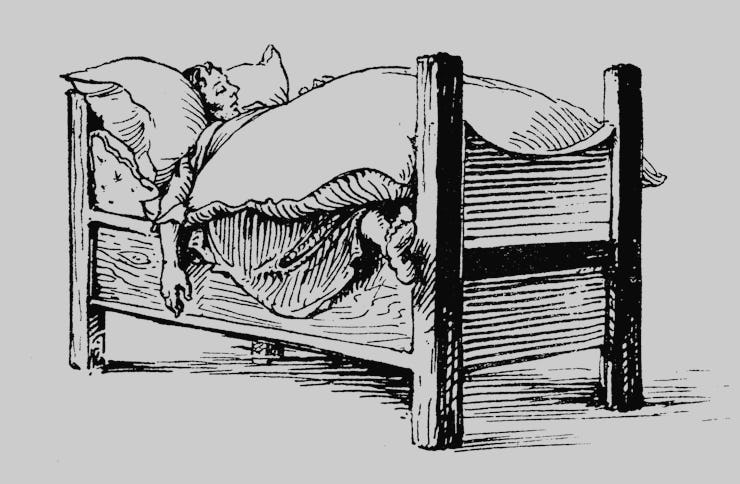Too much sleep may spike risk of this deadly disease by 85 percent
Keeping healthy sleep habits could save your life.

The time you spend sleeping shapes your life awake — and scores of studies show sleep promotes a healthier brain, heart, and immune system. But too much of a good thing may lead to an uptick in a person’s risk of stroke, new research suggests.
The data reveal three startling associations: People who consistently sleep more than 9 hours per night, take naps longer than an hour and half, or who report low-quality sleep have a higher risk of having a stroke.
Oversleeping, long naps, and disrupted sleep could lead to an 85 percent increased risk of stroke.
The findings build on previous studies suggesting prolonged sleep may be a marker for increased risk of stroke. Other research has shown increased risk of stroke in women, women post-menopause, and middle aged and elderly people who sleep for more than eight hours each night.
The paper was published this week in the journal Neurology.
Sleep trackers
The study involved 31,750 people in China with an average age of 62 who had no history of stroke or any other major health problems. Study participants filled out a questionnaire detailing how long they slept each night, their napping habits during the day, and how restful their sleep was. Then, over an average of six years, the researchers tracked who had a stroke, and, if so, what type.
Most people in the study slept moderately, but a significant portion slept long hours: 8 percent of people regularly took naps over an hour and a half, while 24 percent slept for more than nine hours a night.
During the study, there were 1,557 incidences of stroke. Of these, 80 percent were ischemic, involving clots in the brain. The remaining 20 percent were hemorrhagic, involving brain bleeds.
How much is too much?
People who slept at least nine hours a night were 23 percent more likely to later have a stroke than those who slept between seven and eight hours a night.
People who took long naps of more than 90 minutes were 25 percent more likely to later have a stroke than people who took short naps (up to an hour).
For those who enjoyed long naps and more than nine hours of sleep a night, the risk of stroke skyrocketed: this group was 85 percent more likely to have a stroke than people who were moderate sleepers and nappers.
Getting too much sleep at night and taking long naps boosts stroke risk by 85 percent, a new study suggests.
The findings suggest a sleep schedule sweet spot: Less than nine hours of restful sleep a night, with the occasional short nap at midday thrown in.
The spike in risk of stroke isn’t necessarily caused by the extra zzz’s. Xiaomin Zhang, study author and researcher at Huazhong University of Science and Technology, speculates that other lifestyle factors may be at play.
“Long napping and sleeping may suggest an overall inactive lifestyle, which is also related to increased risk of stroke,” Zhang tells Inverse.
This inactivity may ultimately result in strokes, which kill an estimated 140,000 Americans every year.
Bad sleep = bad health
People who reported poor quality sleep were also 29 percent more likely to later have a stroke than people who said their sleep quality was good. Disrupted sleep may lead people to feel over-tired, which can ultimately affect their mental and physical well-being.
Previous studies show sleep deficiency is associated with increased mortality, behavioral consequences, heart disease and metabolic problems.
Surprisingly, people who slept less than seven hours a night — who might deal with sleep deficiency, apnea, or insomnia — weren’t more likely to have a stroke than those in the 7-8 hour sleep sweet spot.
More research is needed to parse out exactly what’s driving the association.
“These results highlight the importance of moderate napping and sleeping duration and maintaining good sleep quality, especially in middle-age and older adults,” Zhang said in a statement.
Abstract:
Objective: To investigate the associations of sleep duration, midday napping, sleep quality, and change in sleep duration with risk of incident stroke and stroke subtypes.
Methods: Among 31,750 participants aged 61.7 years on average at baseline from the Dongfeng-Tongji cohort, we used Cox regression models to estimate hazard ratios (HRs) and 95% confidence intervals (CIs) for incident stroke.
Results: Compared with sleeping 7 to <8 hours/night, those reporting longer sleep duration (≥9 hours/ night) had a greater risk of total stroke (hazard ratio [HR] 1.23; 95% confidence interval [CI] 1.07–1.41), while shorter sleep (90 minutes vs 1–30 minutes. The results were similar for ischemic stroke. Compared with good sleep quality, those with poor sleep quality showed a 29%, 28%, and 56% higher risk of total, ischemic, and hemorrhagic stroke, respectively. Moreover, we observed significant joint effects of sleeping ≥9 hours/night and midday napping >90 minutes (HR 1.85; 95% CI 1.28–2.66), and sleeping ≥9 hours/night and poor sleep quality (HR 1.82; 95% CI 1.33–2.48) on risk of total stroke. Furthermore, compared with persistently sleeping 7–9 hours/night, those who persistently slept ≥9 hours/night or switched from 7 to 9 hours to ≥9 hours/night had a higher risk of total stroke.
Conclusions: Long sleep duration, long midday napping, and poor sleep quality were independently and jointly associated with higher risks of incident stroke. Persistently long sleep duration or switch from average to long sleep duration increased the risk of stroke.